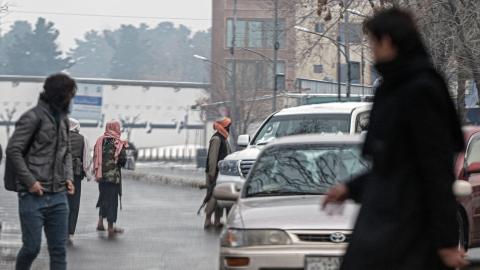US officials met representatives of the Taliban in Qatar last week, the first face-to-face talks since the militants took over Afghanistan two years ago.
The US does not recognize the Taliban as the government of Afghanistan, but it agreed to engage on specific issues. There was no shortage of those. The top issues were the growing humanitarian crisis, transnational terrorism, the poor economic situation, and the continued breakdown in women’s rights. After the meeting one thing became clear: the Biden administration has no coherent strategy to deal with Afghanistan.
In fact, Afghanistan has been a disaster for the administration, and it has only itself to blame. Donald Trump agreed to a deal with the Taliban in February 2020 for the phased withdrawal of US forces by May 2021. This was as the starting point that led to the Afghan government’s collapse and the Taliban’s return to power.
In January 2021, when Biden took office, instead of canceling Trump’s flawed agreement he merely postponed America’s withdrawal from May to September. By July, almost all US and international forces had left. On Aug. 15, the Taliban took Kabul. Shockingly, by September 2021, the 20th anniversary of the 9/11 attacks, the Taliban controlled more of Afghanistan than it did back then.
Since the last US soldier left Kabul airport in August 2021, after two decades focused intensely and at times exclusively on Afghanistan, the Biden administration has had no real Afghan policy to speak of. This needs to change.
A good example of this is counterterrorism. Biden has been in denial about the terrorist situation in Afghanistan. As recently as last month, he said the Taliban had been cooperating on terrorism and there was no Al-Qaeda in the country.
After the talks last week in Doha, the American delegation “took note” of the Taliban's “continuing commitment not to allow Afghanistan to be used as a platform for attacks on the US and its allies,” and acknowledged a “decrease in large-scale terrorist attacks against Afghan civilians.” This assessment is not only laughable, it also contradicts all the available evidence.
It is obvious that any decrease in terrorist attacks against Afghan civilians is because the Taliban are no longer leading an insurgency. Meanwhile transnational terrorist groups have flourished. The most recent report on the peace and security of Afghanistan by the UN Analytical Support and Sanctions Monitoring Team lays out in detail the growing transnational terrorist threats that have evolved in Afghanistan since the Taliban took over two years ago.
An estimated 21 terrorist groups operate freely in Afghanistan. Some have global ambitions, while some are more regionally focused. Almost all enjoy the hospitality and protection of the Taliban, the two most dangerous being Al-Qaeda and Daesh.
Senior members of Al-Qaeda, who had not set foot in Afghanistan for almost two decades, are now roaming freely. Al-Qaeda’s reestablished presence in Afghanistan was best illustrated when its leader, Ayman Al-Zawahiri, was killed in a US drone strike in Kabul last summer.
But terrorism is only one of many problems the White House has when it comes to developing a coherent Afghan policy. Another pressing issue is the status of the Afghans who helped the US over the years and feared for their lives as the Taliban marched on Kabul. Tens of thousands of Afghans were brought to the US in the final weeks of the American military presence. Almost two years later, Congress and the White House have failed to pass the legislation to give these Afghans a legal pathway to remain in the US. There’s the added complication of the tens of thousands of Afghans who were promised evacuation but remain stranded there under Taliban control.
There is also no strategy for the groups emerging in opposition to the Taliban. The National Resistance Front, based in the Panjshir valley but active across northern provinces, continues to be the only genuine and non-extremist armed opposition force against Taliban rule. Though the US worked closely with the National Resistance Front’s predecessor, the Northern Alliance, in the early days after the 9/11 attacks, there has been no public statement of support or any attempt by the US government to engage in dialogue with the organization. Last summer, a US State Department spokesman said: “We do not support organized violent opposition to the Taliban, and we would discourage other powers from doing so as well.”
As the US grapples with developing an Afghan policy, it should not be tempted to let the recent talks in Doha be the start of a process in which Washington formally recognizes the Taliban government. The Taliban would benefit from such legitimacy and the international community should do everything it can to prevent it.
Since the Taliban takeover, Afghanistan has been on a downward spiral. There is an acute humanitarian crisis. The Taliban promised that young girls could go to school, but this still has not happened. The internal divisions inside the Taliban leadership and the overall security situation add to the humanitarian crisis: it is not too dissimilar from the 1990s when the Taliban were last in power.
Ignoring the problems and challenges in Afghanistan in the 1990s planted the seed for the 9/11 terrorist attacks. This lesson must be learned. Although American policymakers might have “Afghan fatigue,” this is no excuse for not having a policy.
Instead of pointless talks with the Taliban, the US should be working with international and regional partners to develop a comprehensive and coherent strategy for the country before it is too late.



















